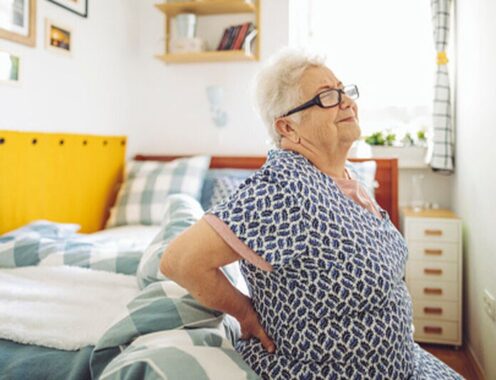GPs can now prescribe a range of specific apps to help people manage low back pain, under NICE draft recommendations.
New guidance, published today, allows for adoption of the technology while more evidence on their effectiveness is being collected.
Seven digital technologies have been approved for use in people aged 16 or older with low back pain to try and increase capacity for support on the NHS.
The apps take a variety of approaches with some offering access to a multidisciplinary team who can give advice via video or an email or message function and others using guided exercise advice with video demonstrations.
However, they will need appropriate regulatory approval before rollout, with only three of them having shown they meet the standards so far.
The companies behind the apps will have to confirm on an annual basis that evidence is being generated and analysed on their wider use, NICE said.
After three years NICE will assess the technologies for routine use in the NHS in the usual way.
Two more technologies looked at in the early value assessment programme were not yet approved for NHS use because more research is needed, the committee said.
Overall, more data is needed on pain and disability outcomes as well as quality of life in those using the apps, whether they adhere to their use and what impact it has on GP and physiotherapist appointments and A&E attendance, NICE said.
But they will potentially provide access to rapid advice for those with low back pain and offer another treatment option particularly for those who need more flexible access or prefer a digital therapy over face to face.
This could reduce inequalities in accessing musculoskeletal services across the and reduce waiting lists as well the use of medication and the potential need for surgery, the independent evaluation committee said.
Patients will need to be assessed by a GP or other healthcare professional before they are offered access to the digital treatments.
Four of the technologies are designed to interact with GP systems which was important for continuity of care, the committee said.
But patients should still be able to choose whether to use an app and should still have the option to remain on a waiting list for a face to face appointment if they agree to engage with one of the apps.
The NHS Long Term Plan states that low back pain is the biggest cause of disability. Musculoskeletal conditions accounts for 30% of GP consultations annually and according to Public Health England there are 9 million people living with long-term back pain in England.
Mark Chapman, interim director of medical technology and digital evaluation at NICE, said: ‘More than two million people suffer from low back pain each year and there are considerable pressures on NHS services to provide the treatment and care to those needing support with this debilitating condition.
‘The digital platforms our committee has recommended could provide the NHS with extra capacity to get those effected off waiting lists, which vary in length across the country, and into treatment.’
We believe these technologies have the potential to offer value for money for the taxpayer, while offering people with low back pain quicker access to get the care they need at a time and place of their choosing.’
Dr Victoria Tzortziou Brown, vice chair of external affairs at the RCGPs, said the technologies may well be valuable in helping some people with musculoskeletal problems to manage their condition more effectively.
‘However, digital tools will not suit all patients, especially those who are unfamiliar with or struggle to use technology, and their preferences should be taken into account when they are offered new digital technologies as part of their treatment.’
But she added general practice was currently under immense pressure delivering 150,000 extra appointments per day in August than before the pandemic and with 883 fewer GPs.
‘Therefore, we are very interested in any new technologies which might improve patient health outcomes or streamline processes for treatment. What we need most, however, are more GPs so that we can give all our patients the time and care they need and deserve.’
Health minister Will Quince said added that the apps would offer a range of services to help patients manage lower back pain.
‘This will help to reduce pressures on the NHS and can help to cut waiting lists – one of the government’s top priorities – and will help people to live happier, healthier lives.’
A consultation on the recommendations is now open at nice.org.uk until Wednesday 25 October 2023.













Another excuse for them not to move, lose weight or take ownership. Yeah sit back relax and download this app.